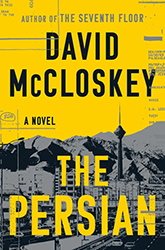This idiosyncratic novel, a splendid representation of Israel’s dark side set against its glorification by advocates, excels in characterization. Schnytzer penetrates the interior world of his principal figures, exposing their strengths, weaknesses, goals, and fears. We meet successful government leaders and aspiring candidates for the highest offices. We enter the shadowy world of Mossad operatives and the work-a-day drudgery and ambitions of an aging veteran police inspector, Moshe Biton. We meet a fascinating figure just released from prison, David Hartbacher (“tough guy”), and learn of the lineage that has contributed to his present identity as an Israeli vigilante, and his involvement with the kidnapped son of a senior Mossad agent.
We meet the disgraced and somewhat disgraceful Limor Schwartz as she tries to claw her way back to her former position as a senior Mossad operative, using all the skills and tools at her disposal. We explore a society that has a bifurcated identity, captured somewhat by the slogan “It’s time to replace Zionism with Judaism.” Under the pressures of Israel’s situation, many of the characters are at war with themselves.
We encounter, along with the Israeli characters, a host of Arab people responding to the Palestinian situation. We visit Cairo, Benghazi, the Israeli capitals, and many other vividly drawn locations. We meet terrorist leaders, their underlings, and their victims. We learn how members of the enemy camps are recruited to serve a new controller and develop a new, if vulnerable, allegiance.
The symbolic center of this all is a tall fellow living in apparent poverty, coupled with seeming mental and emotional disarray. He has a childlike nature and inhabits a twilight zone. He loses track, sometimes, of who he is and what he should be doing. Known to readers through most of the book as Zahid, this Libyan-born man first named Tzion had for a long time buried his Jewish identity to serve as an agent charged with various missions by a powerful and feared Arab leader. When his identity begins to disintegrate, he states the realization that “I am no longer Tzion. I haven’t been Tzion for years. I am no longer even Zahid. He too died years ago.” The scenes in which Schnytzer details this unstable personage are among the most compelling in the novel.
Like Zahid, the entire novel suffers from a shaky and shifting identity; it cries for tighter cohesion. Readers would have benefited from more markers of time and place, and a formal cast of characters. But perhaps Schnytzer risks disorienting readers in order to be true to the world he portrays so brilliantly.
Philip K. Jason is professor emeritus of English at the United States Naval Academy. A former editor of Poet Lore, he is the author or editor of twenty books, including Acts and Shadows: The Vietnam War in American Literary Culture and Don’t Wave Goodbye: The Children’s Flight from Nazi Persecution to American Freedom.




